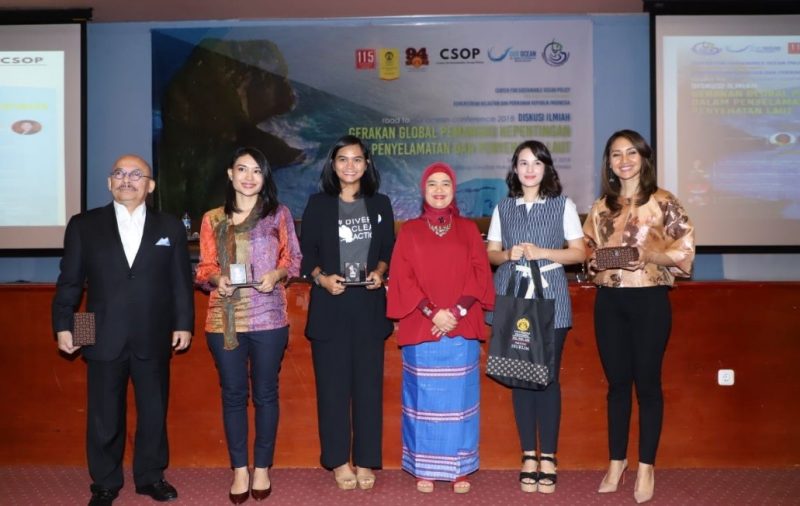Various Causes of Law Violations at Sea, This Is the Solution
The risk of law violations such as pollution, illegal fishing, to serious crimes such as slavery and narcotics smuggling between countries is still vulnerable to occur in the Indonesian sea area. The extent of national waters is a challenge for the government in its efforts to safeguard maritime territories from unlawful acts.
One of the efforts that needs to be done is increasing the government’s strict supervision by increasing security while preparing the right rules to prevent law violations. Because, the weak supervision of the sea area has the effect of losing the potential of national marine wealth which has abundant natural resources.
This issue was conveyed by environmental law expert and Dean of the Faculty of Law, Universitas Indonesia Prof. Melda Kamil Ariadno when speaking at a scientific discussion themed “Global Movement of Stakeholders in the Rescue and Health of Sea” at FHUI, Depok, Tuesday (10/23/2018).
“Maritime issues are crucial, especially Indonesia. Everyone thinks about the use of the sea, but does not think about how the sea can be safely navigated and preserved,” Melda told Hukumonline on the sidelines of the event.
Shee explained that the issue of security and sustainability of the sea has actually become a global concern. Improving security and sustainability of the sea is one of the contents of the agreement of the United Nations (UN) 2017-2030 Sustainable Development Goals (SDGs) published in 2017.
Unfortunately, the global agreement is not enough without the involvement of the government which so far has not been maximally safeguarding the security and sustainability of the sea. In particular, she highlighted the lack of coordination between the central government and the regions, so that marine safeguards were not optimal.
“All of this (SDGs) is useless because this is only a regulation, let alone international law. It’s useless if the country is committed, but the people and the local government are not committed, so there is no meaning,” said Melda.
Melda assessed that public awareness of maintaining security and sustainability of the sea is also very low. Not only individuals, even corporations are also often involved in violations of law at sea. She pointed out that corporations often operate with equipment that is not environmentally friendly, which results in damaging the marine ecosystem.
Not to mention, she said, the habit of coastal communities who are still throwing waste into the sea. She regretted that there are still many individuals and corporations who depend on the sea and actually damage the ecosystem. “During this time human activities are not well controlled, for example there are still fishermen catching fish using nets (trol), explosives to poisons that can damage the seabed and coral reefs,” Melda said.
Not only fishermen, marine damage can be caused by merchant ships that pass through national waters. Melda explained that many large merchant ships operate not in compliance with provisions such as the application of ballast water systems or ballast water used as ballast and balancing vessels when sailing.
Melda explained that although the ballast water functions to balance the ship, this system has a serious impact on ecology. This damage can occur because many marine species will be disrupted when the ballast water system operates. “Sometimes this ballast water mixes with the oil waste inside the ship. So, when the ballast water is released the ship can pollute the sea,” said Melda.
Provisions regarding vessel ballast water management have also been agreed upon at the International Maritime Organization (IMO) Ballast Water Management Convention (BWM). Indonesia is one of the countries that ratified the convention. That way, all ships in Indonesian waters are required to implement a water ballast system and sea-friendly management.
But the fact is, said Melda, not all ships implement marine-friendly ballast water systems because of the high cost. “Ocean-friendly ballast water technology is not easy and requires large funds, so they (the industry) do not pay attention to ballast water well and so pollute the environment,” she explained.
In addition to these violations, Hukumonline tried to summarize some violations of the law of the sea in Indonesia that came to the public. For example, illegal fishing by foreign vessels which has recorded as many as 363 ships was sunk by the Ministry of Maritime Affairs and Fisheries during 2014-2017. There was also the PT Pertamina (Persero) oil spill in Balikpapan which claimed lives and polluted the environment.
Attention to the improvement of security and sustainability of the sea was also conveyed by the Special Staff Coordinator for the Task Force to Eradicate Illegal Fishing (Task Force 115), Mas Achmad Santosa. He said with law enforcement in the national sea, the utilization of natural resources could be maximized.
He estimated Indonesia has as much as 4 percent marine assets of the global total of US $ 24 trillion. Supposedly, the utilization of the marine wealth is hampered due to legal violations that occur in the national sea area. “Transhipment has a negative impact on fisheries to human rights. Because in transhipment, there is no data collection from the fish caught. In addition, crew (ship crews) are also much longer in the sea and cause modern slavery (slavery). This happens a lot in eastern Indonesia,” Santosa said. Therefore, he asked the awareness of the government and the public about the importance of the existence of the sea needs to be improved to prevent the occurrence of violations of the law. “So, this sea can be used for the benefit of many people,” he hoped.

